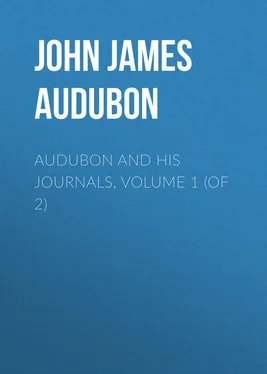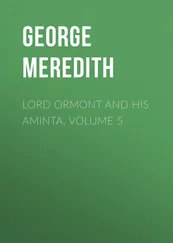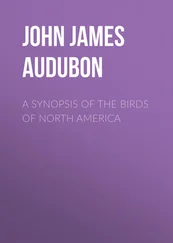John Audubon - Audubon and his Journals, Volume 1 (of 2)
Здесь есть возможность читать онлайн «John Audubon - Audubon and his Journals, Volume 1 (of 2)» — ознакомительный отрывок электронной книги совершенно бесплатно, а после прочтения отрывка купить полную версию. В некоторых случаях можно слушать аудио, скачать через торрент в формате fb2 и присутствует краткое содержание. Жанр: foreign_antique, foreign_prose, на английском языке. Описание произведения, (предисловие) а так же отзывы посетителей доступны на портале библиотеки ЛибКат.
- Название:Audubon and his Journals, Volume 1 (of 2)
- Автор:
- Жанр:
- Год:неизвестен
- ISBN:нет данных
- Рейтинг книги:5 / 5. Голосов: 1
-
Избранное:Добавить в избранное
- Отзывы:
-
Ваша оценка:
- 100
- 1
- 2
- 3
- 4
- 5
Audubon and his Journals, Volume 1 (of 2): краткое содержание, описание и аннотация
Предлагаем к чтению аннотацию, описание, краткое содержание или предисловие (зависит от того, что написал сам автор книги «Audubon and his Journals, Volume 1 (of 2)»). Если вы не нашли необходимую информацию о книге — напишите в комментариях, мы постараемся отыскать её.
Audubon and his Journals, Volume 1 (of 2) — читать онлайн ознакомительный отрывок
Ниже представлен текст книги, разбитый по страницам. Система сохранения места последней прочитанной страницы, позволяет с удобством читать онлайн бесплатно книгу «Audubon and his Journals, Volume 1 (of 2)», без необходимости каждый раз заново искать на чём Вы остановились. Поставьте закладку, и сможете в любой момент перейти на страницу, на которой закончили чтение.
Интервал:
Закладка:
The former life of drawing portraits, giving lessons, painting birds, and wandering through the country, began again, though there was less of this last, Audubon realizing that he must make money. He had had to use strong persuasions to induce Mrs. Audubon to join him in New Orleans. She had relatives in Cincinnati, as well as many friends, and several pupils brought her a small income. Who, recalling her early married life, can wonder that she hesitated before leaving this home for the vicissitudes of an unknown city? She and her husband were devotedly attached to each other, but she thought more of the uncertainty for her sons than for herself. They were now boys of twelve and nine years old, and their mother, whose own education was far beyond the average, realized how unwise a thing for them the constant change was. Audubon was most anxious also that his "Kentucky lads," as he often called them, should be given every advantage, but he had the rare quality of being able to work equally well in any surroundings, in doors or out, and he failed to understand why others could not, just as he failed to see why his wife should ever doubt the desirability of going anywhere, at any time, under any conditions. He thus writes to her in a letter, dated New Orleans, May 3, 1821: "Thou art not, it seems, as daring as I am about leaving one place to go to another, without the means. I am sorry for that. I never will fear want as long as I am well; and if God will grant me health with the little talents I have received from Nature, I would dare go to England or anywhere, without one cent, one single letter of introduction to any one."
This, as we know, was no empty boast, but the principle on which Audubon proceeded numberless times in his life. His own courage, or persuasions, brought his wife, as has been said, to join him in the Crescent City, and here as elsewhere that noble woman proved her courage and endurance fully equal to his, although perhaps in another line.
Under the date of January 1, 1822, Audubon writes: "Two months and five days have elapsed before I could venture to dispose of one hundred and twenty-five cents to pay for this book, that probably, like all other things in the world, is ashamed to find me so poor." On March 5th of the same year: "During January my time was principally spent in giving lessons in painting and drawing, to supply my family and pay for the schooling of Victor and Johnny at a Mr. Branards', where they received notions of geography, arithmetic, grammar, and writing, for six dollars per month each. Every moment I had to spare I drew birds for my ornithology, in which my Lucy and myself alone have faith. February was spent in drawing birds strenuously, and I thought I had improved much by applying coats of water-color under the pastels, thereby preventing the appearance of the paper, that in some instances marred my best productions. I discovered also many imperfections in my earlier drawings, and formed the resolution to redraw the whole of them; consequently I hired two French hunters, who swept off every dollar that I could raise for specimens. I have few acquaintances; my wife and sons are more congenial to me than all others in the world, and we have no desire to force ourselves into a society where every day I receive fewer bows."
This winter (1821-1822) in New Orleans, proved to Audubon that his wife's judgment was correct; it was not the place for them to make either a permanent income or home. True, they had been able to live with extreme simplicity, and to send the boys to school; they had had their own pleasures, as the worn, brown volume, the journal of 1822-24, with its faded entries, bears witness. There are accounts of walks and of musical evenings when they were joined by one or two friends of like tastes and talents. Both played well, she on the piano, and he on a variety of instruments, principally the violin, flute, and flageolet. For over two months a fifth inmate was added to the home circle in Mr. Matabon, a former friend, whom Audubon found one morning in the market, in a state of great poverty. He at once took him to his house and kept him as a guest, till, like Micawber, "something turned up" for him to do. When this gentleman left, this entry is made: "Mr. Matabon's departure is regretted by us all, and we shall sorely miss his beautiful music on the flute."
Summer approaching, when those who purchased pictures and took drawing-lessons were about to leave the city, Audubon accepted a position as tutor in the household of a Mr. Quaglas near Natchez. Mrs. Audubon, who had for some time been teaching in the family of Mr. Brand, removed to that gentleman's house with her sons; they, however, were almost immediately sent to school at Washington, nine miles from Natchez, Audubon's salary enabling him to do this, and in September he was joined by his wife.
While at Natchez, the long summer days permitted the drawing of birds as well as the teaching, which was conscientiously performed, and the hope of eventually publishing grew stronger. In the autumn of this year (1822), Audubon met a portrait painter named John Steen or Stein, from Washington, Pa., and thus writes, December, 1822: "He gave me the first lesson in painting in oils I ever took in my life; it was a copy of an Otter from one of my water-colors. Together we painted a full length portrait of Père Antonio, which was sent to Havana."
January, 1823, brought fresh changes. Mrs. Audubon, with her son John, went to Mrs. Percy's plantation, Beechwoods, to teach not only Marguerite Percy, but also the daughters of the owners of the neighboring plantations, and Audubon, with Victor and Mr. Steen, started on a tour of the Southern States in a dearborn, intending to paint for their support. The journal says, March, 1823; "I regretted deeply leaving my Natchez friends, especially Charles Carré and Dr. Provan. The many birds I had collected to take to France I made free; some of the doves had become so fond of me that I was obliged to chase them to the woods, fearing the wickedness of the boys, who would, no doubt, have with pleasure destroyed them." So it would seem boys then were much the same as now. Jackson and other places were visited, and finally New Orleans, whence Audubon started for Louisville with Victor, May 1. The whole of this summer (1823) was one of enjoyment in many ways to the naturalist. He felt his wife was in a delightful home (where she remained many years), beloved by those around her; Victor now was nearly fourteen, handsome, strong, and very companionable, old for his years, and as his father was always young for his, they were good comrades, and till both were attacked by yellow fever, the days passed smoothly on. Nursed through this malady by the ever devoted wife and mother, who had come to them at once on hearing they were ill, some time was spent at the Beechwoods to recuperate, and on October 1, 1823, Audubon with Victor departed for Kentucky by boat. The water being low, their progress was greatly delayed; he became impatient and at Trinity left the boat with his son and two gentlemen, and walked to Louisville. This walk, of which we have a full published account 28 28 See Episode: "A Tough Walk for a Youth."
began on October 15, and on the 21st they reached Green River, when Victor becoming weary, the remaining distance was performed in a wagon. It was on this journey, which Audubon undertook fearing, so he says, that he should not have enough money to provide for himself and Victor in Louisville beyond a few weeks, that he relates this incident: "The squatter had a Black Wolf, perfectly gentle, and completely under the control of his master; I put my hand in my pocket and took out a hundred-dollar bill, which I offered for it, but it was refused. I respected the man for his attachment to the wolf, for I doubted if he had ever seen a hundred dollars before."
Интервал:
Закладка:
Похожие книги на «Audubon and his Journals, Volume 1 (of 2)»
Представляем Вашему вниманию похожие книги на «Audubon and his Journals, Volume 1 (of 2)» списком для выбора. Мы отобрали схожую по названию и смыслу литературу в надежде предоставить читателям больше вариантов отыскать новые, интересные, ещё непрочитанные произведения.
Обсуждение, отзывы о книге «Audubon and his Journals, Volume 1 (of 2)» и просто собственные мнения читателей. Оставьте ваши комментарии, напишите, что Вы думаете о произведении, его смысле или главных героях. Укажите что конкретно понравилось, а что нет, и почему Вы так считаете.












